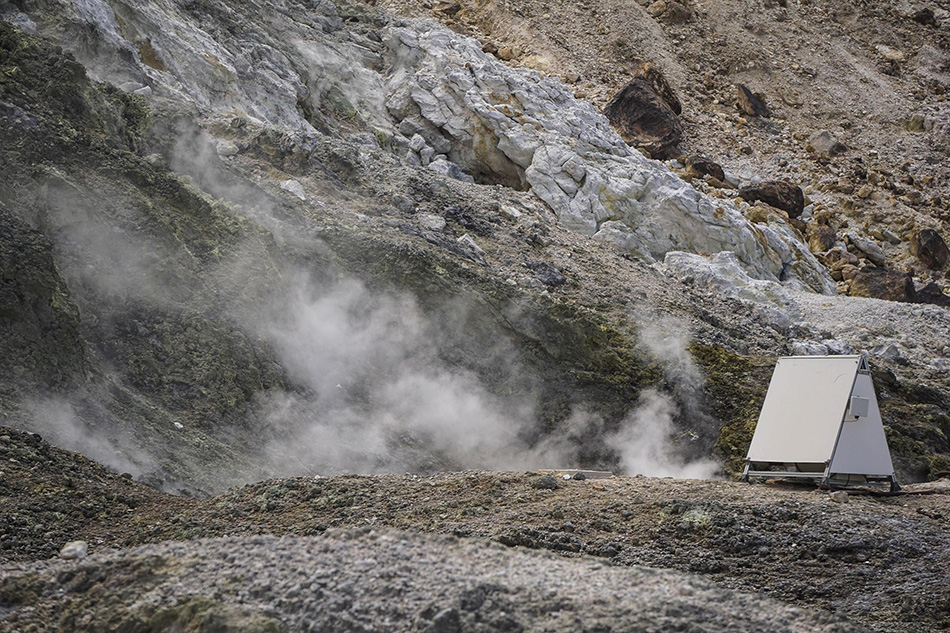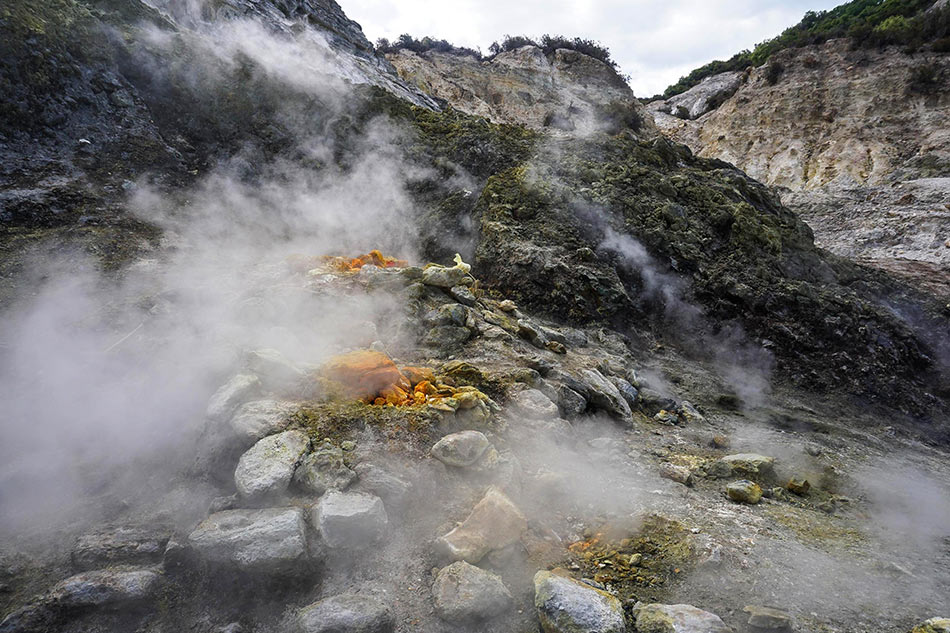Eruption imminent for Europe super volcano?
ADVERTISEMENT

Welcome, Kapamilya! We use cookies to improve your browsing experience. Continuing to use this site means you agree to our use of cookies. Tell me more!
Eruption imminent for Europe super volcano?
Deutsche Welle
Published Oct 06, 2023 06:09 AM PHT
An earthquake with a magnitude of 4.2 struck Naples on the morning of Wednesday, October 4, 2023. It was the strongest jolt experienced by the volcanic area, known as the Campi Flegrei or Phlegraean Fields, in more than four decades. The name of the area originates from the Greek word for "burning fields."
An earthquake with a magnitude of 4.2 struck Naples on the morning of Wednesday, October 4, 2023. It was the strongest jolt experienced by the volcanic area, known as the Campi Flegrei or Phlegraean Fields, in more than four decades. The name of the area originates from the Greek word for "burning fields."
It is one of many, but the strongest of the small earthquakes that has rocked the region recently. Both experts and the public fear these tremors could cause a "super volcano" to erupt and force people into mass evacuation. Many residents in the region have already prepared an emergency bag in case the need arises for a sudden evacuation.
It is one of many, but the strongest of the small earthquakes that has rocked the region recently. Both experts and the public fear these tremors could cause a "super volcano" to erupt and force people into mass evacuation. Many residents in the region have already prepared an emergency bag in case the need arises for a sudden evacuation.
What is the Campi Flegrei?
The Campi Flegrei is a depressed volcanic area, formed as a result of repeated explosive eruptions. One of them, an outburst 40,000 years ago, was one of the most powerful catastrophes in the world, affecting global climate. This might have led to the extinction of the Neanderthal, some researchers say. Magma from that blast has been found in Greenland, some 4,500 km (2,796 miles) away.
The Campi Flegrei is a depressed volcanic area, formed as a result of repeated explosive eruptions. One of them, an outburst 40,000 years ago, was one of the most powerful catastrophes in the world, affecting global climate. This might have led to the extinction of the Neanderthal, some researchers say. Magma from that blast has been found in Greenland, some 4,500 km (2,796 miles) away.
Across the Bay of Naples from the Campi Flegrei sits Pompeii, a key tourist attraction in southern Italy, known for preserving the ruins of volcanic calamities. In Pompeii, thousands were killed in an eruption of Mount Vesuvius in 79 AD. The volcano most recently erupted in 1538.
Across the Bay of Naples from the Campi Flegrei sits Pompeii, a key tourist attraction in southern Italy, known for preserving the ruins of volcanic calamities. In Pompeii, thousands were killed in an eruption of Mount Vesuvius in 79 AD. The volcano most recently erupted in 1538.
ADVERTISEMENT
The Campi Flegrei is home to a much bigger volcano than Vesuvius ― it's dubbed a 'super volcano' by many. Sometimes the volcano is called the "next Vesuvius," as it is unlikely to get its own name until it actually erupts. While experts have not spotted a volcanic cone in the ground through which lava would flow out, if the volcano erupts with full power, it could kill millions and destroy entire towns.
The Campi Flegrei is home to a much bigger volcano than Vesuvius ― it's dubbed a 'super volcano' by many. Sometimes the volcano is called the "next Vesuvius," as it is unlikely to get its own name until it actually erupts. While experts have not spotted a volcanic cone in the ground through which lava would flow out, if the volcano erupts with full power, it could kill millions and destroy entire towns.
The geological history of the caldera, the cauldron left behind when the magma empties out after an eruption, reveals that over the past 15,000 years, it has undergone more than 70 eruptions, forming volcanic edifices, craters and lakes, such as Astroni, Solfatara and the lake of Averno.
The geological history of the caldera, the cauldron left behind when the magma empties out after an eruption, reveals that over the past 15,000 years, it has undergone more than 70 eruptions, forming volcanic edifices, craters and lakes, such as Astroni, Solfatara and the lake of Averno.
Why is there fear of volcanic eruption now?
The volcanic region near Naples sprawls across some 180 square kilometers (almost 70 square miles), and the epicenter of the recent earthquakes falls in the Campi Flegrei region.
The volcanic region near Naples sprawls across some 180 square kilometers (almost 70 square miles), and the epicenter of the recent earthquakes falls in the Campi Flegrei region.
While thousands of small tremors have been felt in the region since 2019, both their frequency and intensity have increased this year. This has raised suspicions on whether the volcano brewing below the surface is about to erupt in the near future.
While thousands of small tremors have been felt in the region since 2019, both their frequency and intensity have increased this year. This has raised suspicions on whether the volcano brewing below the surface is about to erupt in the near future.
The Italian government's Department of Civil Protection has warned that seismic activity is more pressing of an issue than a volcanic eruption right now, and that more quakes could follow. On their social media channels, they have recorded that the recent tremors did not cause any major damage. Further, they have asked local authorities to inspect buildings for damage to identify weakness in the event of more tremors in the future.
The Italian government's Department of Civil Protection has warned that seismic activity is more pressing of an issue than a volcanic eruption right now, and that more quakes could follow. On their social media channels, they have recorded that the recent tremors did not cause any major damage. Further, they have asked local authorities to inspect buildings for damage to identify weakness in the event of more tremors in the future.
ADVERTISEMENT
Experts suggest that the threat of volcanic activity comes from a geological phenomenon called bradyseism that is common in the region. It is the vertical ascent of soil due to pressure from the magma below.
Experts suggest that the threat of volcanic activity comes from a geological phenomenon called bradyseism that is common in the region. It is the vertical ascent of soil due to pressure from the magma below.
In the early 1980s, a similar increase in tremors was felt in the region without it leading to a volcanic eruption.
In the early 1980s, a similar increase in tremors was felt in the region without it leading to a volcanic eruption.
While Italy's National Institute for Geophysics and Volcanology (INGV) has issued a warning that more earthquakes can be expected in the coming days, no proof of rising magma has been observed so far.
While Italy's National Institute for Geophysics and Volcanology (INGV) has issued a warning that more earthquakes can be expected in the coming days, no proof of rising magma has been observed so far.
What could happen during an eruption?
The Campi Flegrei region has always manifested itself mainly through explosive eruptions. If that happens again, we may see the formation of a tall eruptive column made out of gas, lava bits and ash. This could lead to fall-out of volcanic material raining down on nearby regions. The debris can fly for many kilometers ― remember the extreme example of Greenland!
The Campi Flegrei region has always manifested itself mainly through explosive eruptions. If that happens again, we may see the formation of a tall eruptive column made out of gas, lava bits and ash. This could lead to fall-out of volcanic material raining down on nearby regions. The debris can fly for many kilometers ― remember the extreme example of Greenland!
During an eruption, the volcano could spew out a pyroclastic flow, which is characterized by an avalanche of gases, ash and volcanic fragments moving at high temperatures and speed.
During an eruption, the volcano could spew out a pyroclastic flow, which is characterized by an avalanche of gases, ash and volcanic fragments moving at high temperatures and speed.
ADVERTISEMENT
If the eruption is strong enough, it could affect global temperatures and climate, and could potentially lead to a much warmer winter in the northern hemisphere.
If the eruption is strong enough, it could affect global temperatures and climate, and could potentially lead to a much warmer winter in the northern hemisphere.
Edited by: Carla Bleiker
Edited by: Carla Bleiker
ADVERTISEMENT
ADVERTISEMENT




